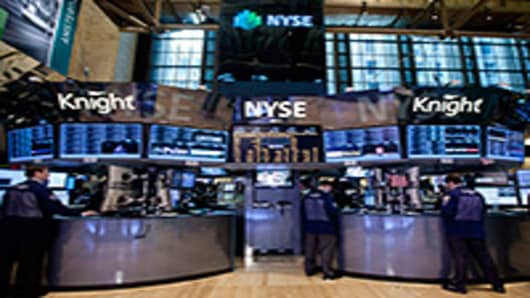A teetering Knight Capital Group announced a $400 million deal on Monday with a group of investors that keeps the company in business, but comes at a huge cost to investors.
The firms will buy 2 percent convertible preferred stock to save Knight, which was brought to its knees last week by a software glitch that caused errant trading in dozens of stocks.
The deal is expected to close later Monday morning and came to light after Knight weighed a variety of offers.
"We made the right choice for this firm," Knight CEO Thomas Joyce told CNBC. "We had tons of inquiries across a wide spectrum of ideas. I'm very confident that we settled on the best solution for our company."
Joyce said the total offers "was a big number" that was "in the neighborhood" or 90 inquiries.
"The flattering thing is how the industry responded to us," he said during a live interview. "The wildly flattering thing was how our clients responded to us...when we were under stress last week."
The preferred shares are convertible into about 267 million shares of common stock, Knight said in a U.S. Securities and Exchange Commission filing, implying the investors would get a stake of a little more than 70 percent in Knight.
The New York Stock Exchange said it will temporarily transfer Knight's market-making responsibilities on more than 500 stocks — and related Knight employees — to Chicago-based Getco (in which private-equity firm General Atlantic owns a stake), until the recapitalization is complete. The exchange said both companies cooperated with the transfer.
Shares fell 33 percent to $2.70 in pre-market trading Monday from a $4.05 close on Friday, before being halted. Less than three weeks ago Knight traded for more than $12 a share.
The filing did not name the investors. But according to a person familiar with the matter, the consortium of buyers include Getco, the investment bank Jefferies & Co., Blackstone Group, and the brokerages TD Ameritrade, Stephens Inc., and Stifel Nicolaus .
People familiar with the talks during the weekend had cautioned that final details were still being buttoned down, and that no deal would be announced until regulators approved of the deal.
All the buyers of the convertible securities are expected to convert after 10 business days, a person familiar with the matter said.
Jefferies led the offering and has been engaged with Knight since a software glitch on Wednesday caused Knight to buy unwanted positions in about 148 stocks, eventually prompting a $440 million loss.
Late that day, Goldman Sachs agreed to purchase the unwanted stock positions from Knight as part of a big basket, people familiar with the matter said, at a discount to their original purchase price.
JPMorgan analyst Kenneth Worthington, in a client note after the initial reports on the rescue Sunday night, said the deal presaged Knight's eventual breakup.
"We don't expect investors to value Knight as an ongoing entity given its technology glitch generated a pre-tax loss equal to (about) 30 percent of shareholders equity and nearly wiped out the company in just 30 to 45 minutes of trading," he said.
Future Still Uncertain
But even if Knight has been saved for now, the company could face litigation from shareholders who have seen the value of their holdings plummet.
The potential liability could increase if it were found that Knight violated market rules. The top U.S. securities regulator said on Friday that government lawyers were trying to determine if Knight violated a new rule designed to protect the markets from rogue algorithmic computer trading programs.
Knight's problems started early Wednesday, when a software glitch flooded the New York Stock Exchange with unintended orders for dozens of stocks, boosting some shares by more than 100 percent and leaving the company with the trading loss.
As the nation's largest provider of retail market-making in New York Stock Exchange and Nasdaq-listed stocks, Knight buys and sells shares for clients. It also provides liquidity to equity markets by stepping in to buy and sell stocks, using its own capital to ensure orderly, smooth activity.
Knight's computers had been loaded with new software Tuesday that was designed to accommodate a change on the NYSE, according to people familiar with the matter. When trading began, however, the computers poured a huge number of orders into the market.
For about 10 minutes it was unclear where the orders were originating, according to people familiar with the matter. After NYSE officials identified Knight as the source, it took another 10 minutes for the company to figure out the source.
The damage to Knight was swift. Whereas Knight once accounted for 20 percent of the market-making activity in shares of Apple, by midday Friday it was the market maker for just 2 percent of the share volume, according to data from Thomson Reuters Autex.
Knight's troubles highlight how vulnerable market makers are to the complex web of computers and software that constitute the modern marketplace. For investors already suspicious that the system might be fundamentally broken after the "Flash Crash" of 2010 and the botched Facebookinitial public offering in May, the troubles at Knight have only added to concerns.
—By CNBC’s David Faber and Kate Kelly; Kayla Tausche, John Melloy, Jeff Cox and Reuters contributed to this report.


